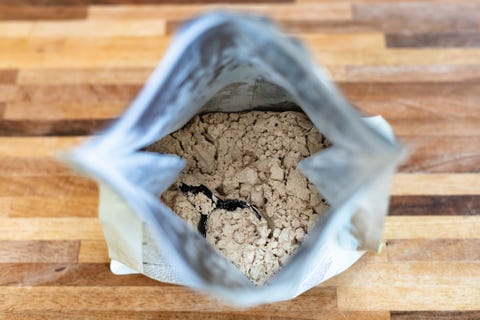
ArtistGNDphotographyGetty Images
Protein shakes are great. They’re easy to make—it can be as easy as shaking water and powder together—and convenient for when you’re at the gym, on the go, or just not in the mood to grill a chicken breast or fry a few eggs.
Certain types of shakes, particularly those made with whey and casein, are complete proteins (they have all nine essential amino acids) with high biological value (your body can absorb and use all of these amino acids), which means that they contain high-quality protein similar to the kind you get from meat, fish, and eggs.
As previously reported by Men’s Health, men should aim to get between 1.2 and 1.6 grams of protein per kilogram of bodyweight each day; for a 185-pound man, that’s roughly 90 and 120 grams per day. And sure, you could get that by chugging 4-5 scoops of whey protein powder. But relying so heavily on protein shakes isn’t the best idea, nor is it necessary.
If you’re currently drinking protein shakes like they’re going out of style, it’s probably time to slow up. Remember that protein shakes are nutritional supplements—that means they should supplement the food in your diet, not replace it altogether. (Plus, the taste and texture get super monotonous after a while.)
Certain protein shakes might be a source of complete protein, but they’re not a complete replacement for protein-rich foods.
Wondering how many protein shakes is too much each day? We got you.
What’s in a typical protein shake?
Believe it or not, the Cambridge Dictionary lists an official definition for the term protein shake: “a drink made by mixing protein powder (= a powder containing a substance that makes the body grow and be strong) with milk or water.”
Sure, some people might make protein shakes by mixing protein powder with liquid, fruits, vegetables, and other ingredients in a blender—but really, that’s a smoothie.
For the sake of this discussion, let’s use the dictionary definition. A protein shake is simply a scoop of protein powder, which typically contains 20 to 30 grams of protein, mixed with water.
Now, not all protein powders are created equal. Animal-based protein powders (like whey and casein, which come from milk) contain all nine essential amino acids, as do some plant-based proteins, like pea protein and soy protein. If you’re using protein powder in lieu of other protein sources, you should opt for those that contain all the essential amino acids.
What role should protein shakes play in your diet?
“Protein shakes can provide many nutrients for post-workout recovery for an active person,” Megan Byrd, a a dietitian and blogger at The Oregon Dietitian. A 2018 review published in Frontiers in Nutrition backs this up, finding that protein supplementation pre- or post-workout can boost both recovery and performance. The authors found that the amount of protein needed for this boost varied by person and depending on the activity, but generally it ranged from 20 to 40 grams.
Protein shakes can also fill gaps in your diet. “They’re a great way to get a boost of protein for those who don’t generally get enough or who are prone to muscle loss,” like older adults or people with certain illnesses, Byrd says.
How many protein shakes should you consume on an average day?
While there’s nothing inherently wrong with protein shakes, drinking too many could mean that you’re not getting enough nutrients from other foods.
“In my mind, food should come first,” Byrd says. “But, if you have a food intolerance or struggle to get enough protein in your diet naturally, protein shakes are a great way to get a boost of protein daily.” However, Byrd doesn’t recommend using a protein shake alone to replace a meal, as the nutrient profile doesn’t come close to what you should be getting from a full meal.
“The most I would recommend to an average person is two per day, simply because anything beyond that point is going to cut into your diet in a negative way,” she says. If you work out regularly and you’re trying to build muscle, two protein shakes per day is plenty. And if you’re not that active, you likely don’t need more than one protein shake per day.
If you’re extremely active (more than one workout per day, or extremely long training sessions), three protein shakes per day might be appropriate, Byrd says.
The bottom line? Protein shakes are supplements, not food.
Protein shakes are a convenient and affordable way to up your protein intake, and they can certainly be part of an overall healthy diet. But remember: Protein shakes aren’t food, and you shouldn’t be relying on them too heavily.
This content is created and maintained by a third party, and imported onto this page to help users provide their email addresses. You may be able to find more information about this and similar content at piano.io




Comments are closed.